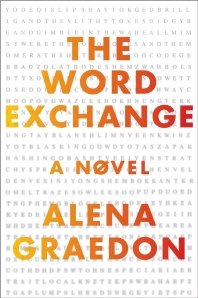By Whitney Matusiak
 Alena Graedon’s debut novel, The Word Exchange, explores an imagined time of conquered print-media prowess—replaced by “smart” technology bordering on artificial intelligence. Graedon’s “dystopian novel for the digital age” follows the perils of Anana Johnson with clever thematic nods to George Orwell’s 1984, Margaret Atwood’s Oryx and Crake, and John Wyndham’s The Chrysalids.
Alena Graedon’s debut novel, The Word Exchange, explores an imagined time of conquered print-media prowess—replaced by “smart” technology bordering on artificial intelligence. Graedon’s “dystopian novel for the digital age” follows the perils of Anana Johnson with clever thematic nods to George Orwell’s 1984, Margaret Atwood’s Oryx and Crake, and John Wyndham’s The Chrysalids.
Forecasting a future nearly devoid of books, magazines, and libraries, Graedon’s The Word Exchange paints the bleak picture of print media, six feet under. Embellishing the all-too-familiar scene of mental, emotional, and physical attachment to handheld devices, we are introduced to Synchronic’s market-cornering technology—the Meme. Intuitive by design, the Meme takes over the wheel of life and does taxes, beams money, fills in writer’s (thinker’s) block, satiates hunger pains, and interfaces with friends and family (actually that doesn’t sound too bad) enabled by only a wisp of thought from its user.
Set in New York City, Anana works for the North American Dictionary of the English Language (NADEL) along with her father, Doug Johnson, who can remember the pre-Meme days of paying with cash and communicating in person. On the cusp of releasing the third and final print version of the dictionary, Doug’s mysterious disappearance renders the launch inexplicably cancelled—but well timed due to the fresh success of Synchronic.
Anana follows a desperate clue hastily left in Doug’s office, giving her hope of finding her father alive and well. Reviving old technology, selectively rekindling and recoiling from relationships, and managing the everyday stresses of work and family, Anana clumsily plods along, amassing other clues. On her journey through subterranean passages to late night visits at the Mercantile Library and beyond, Anana is joined by NADEL nerd-turned-sidekick Bart, as they follow the passage of pneumatic tubes, and the comings and goings of Doug’s friends, colleagues, and enemies.

Meanwhile, technology is advancing at break-neck speed and the latest programs, advertising, and games—including the Word Exchange—are teasing the frail neural pathways. Secret meetings, cyber-terrorism, corruption allegations, and print exposés by the Diachronic Society surround an advancing pandemic called “word flu.” The decay of language is no longer simply a theoretical fear, and Anana is faced with the paradox of having purposefully lost language only to have it be questionably regained, controlled, and monetized. As Anana dodges predators, health risks, and emotional turmoil while slogging through the increasingly anarchic streets in her search to find her father, she eventually looks to the Oxford English Dictionary—the proverbial motherland—for answers to her burning questions.
While Graedon uses her deft language skills to bolster fear and encourage empathy for a digital age gone off the rails, her protagonists, antagonists, and every unnecessary person in between contribute to an overwhelming feeling of claustrophobia. Perhaps meant to convey the unease of being watched and followed, this crowding technique in the writing ultimately lead to paragraph skipping. The pace and narration are broken up regularly with alternative perspectives from Anana and Bart, a style that carefully, if not accidentally, weaves the umpteen sub-plots: boy meets girl, girl loses father, father loses dictionary, all lose language, et cetera (without giving away the story).
What Graedon occasionally lacks in clarity through her overly verbose tangents, she makes up for in the clever use of metaphor and symbolism. If The Word Exchange were a country, then Graedon’s image of the ouroboros (a snake consuming itself) would be on its national flag. This novel successfully explores the pros and cons of a society unknowingly on the bleeding edge of change. The imagery of conflict appears regularly in both character and circumstance, and Graedon does her part to consistently weave the paradox so the reader can effectively gauge the accelerating obsolescence of self.
Graedon tackles the subject of “smart” technology by tapping into its unlimited sources of fear and excitement. Her debut novel is replete with passion and reflection, and there’s undoubtedly room to continue exploring the nexus of self-preservation and language.
Whitney Matusiak is a freelance writer and editor for Jean Marie Creatively, providing copywriting, substantive, and copy editing services for corporate, academic, trade, and lifestyle publications.
This article was copy edited by Karen Kemlo.
